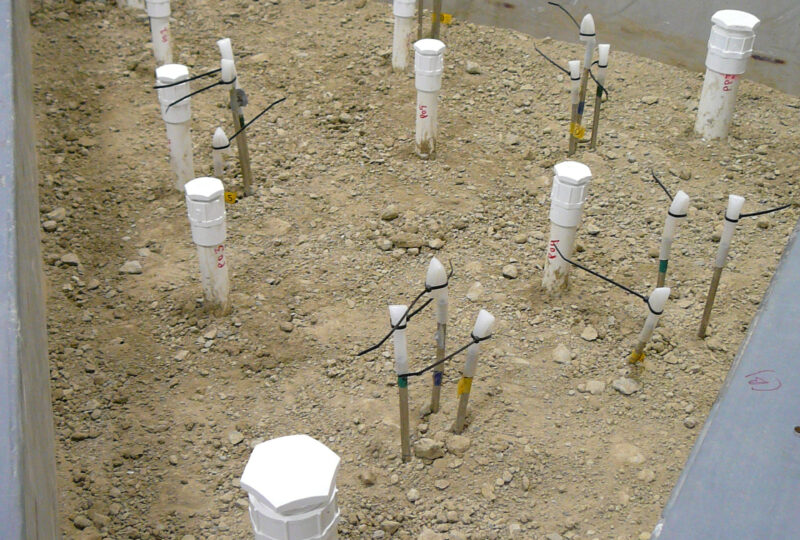EcoRemNunavik collaborative research project
Background: The recent rapid economic development of the circumpolar region, coupled with the use of petroleum hydrocarbons as the main source of energy, has led to numerous accidental diesel spills in the heart of Inuit communities. Available treatment technologies generally prove either too costly, or technically impossible to implement because they are not adapted to the local context. Operating conditions are very difficult due to climate, field constraints and limited local resources. As mentioned by the Kativik Regional Government (KRG), partner and instigator of the project, Nunavik needs an effective alternative solution adapted to the northern reality. The project brings together 3 local partners, the ministry of environment of Québec (MELCCFP), 3 Canadian universities and a private company.
Objectives: Develop a technological train for the in-situ treatment of diesel-contaminated soils, which is economical and adapted to the climatic, logistical and socio-economic context of remote cold regions. One of the two sub-objectives is to formulate an injectable surfactant foam from an innovative oxidizing solution that improves diesel degradation efficiency. The second is to formulate an injectable, context-specific enzyme foam from an enzyme concentrate. These objectives will be achieved through multi-scale laboratory development and field trials under real conditions in the Inuit community of Kangiqsualujjuaq.
Work environment: The PhD project will be carried out in the Contaminant Hydrogeology Laboratory of Professor Richard Martel at the Eau Terre Environnement Research Centre of the Institut national de la recherche scientifique, which is located in the heart of historic Quebec City. Pr. Richard Martel has over 35 years’ experience in the field of hydrogeology. He has been a professor researcher at INRS for 28 years and has supervised and co-supervised over 70 MSc and PhD students and postdoctoral fellows. The Contaminant Hydrogeology Laboratory research team is made up of 6 research professionals/technicians with diverse and complementary backgrounds. The PhD student will work in a collaborative, multidisciplinary research environment.
Tasks: The student will be responsible for multi-scale laboratory tests (batches, 1D sand columns, 2D and 3D sand tanks) for the development of an oxidizing foam and will take part in field tests. The student will also collaborate to the development of a numerical model and will work in collaboration with a postdoctoral fellow in charge of tests related to the development of an enzymatic foam.
Start date
Winter 2026
Research supervision
Richard Martel, professor, INRS
Study program
PhD in Water or Earth sciences (program details in French only)
Eau Terre Environnement Research Centre, INRS
Funding
Scholarship of $28,000/year.
Required qualifications
Master’s degree in environmental sciences, environmental engineering or other relevant field.
Desired skills:
- Autonomy (administrative procedures, travel, experimental plans), adaptability and good team integration skills.
- Spoken and written French or English. Spoken and/or written Inuktitut will be considered an asset.
- Expertise in geological and/or petroleum and/or environmental engineering.
- Intermediate knowledge of environmental sciences, environmental and analytical chemistry: laboratory and on-site sampling, solvent extraction, C10-C50 and PAH analyses (GC-FID, GC-MS), processing and interpretation of results.
- Availability and motivation for intermediate-scale laboratory work: from a few grams of soil to a few tons, as well as for field work in an Inuit community in Nunavik.
- Knowledge of hydrogeology, contaminant hydrogeology, contaminated soil/water and/or groundwater treatment and numerical modelling (Hydrus 1D, COMSOL, Geostudio).
- Knowledge of drilling, injection and petroleum extraction, an asset.
- Knowledge of microbiology and/or bioremediation, an asset.
How to apply
Interested candidates may submit their application by email to richard.martel@inrs.ca and vincent.taillard@inrs.ca including the following documents in PDF: (1) a cover letter with your research interests, (2) a CV, (3) a copy of your university transcripts, and (4) contact details of three referees.
We encourage applications from visible minorities, aboriginal groups, women and people of all sexual orientations and gender identities.

